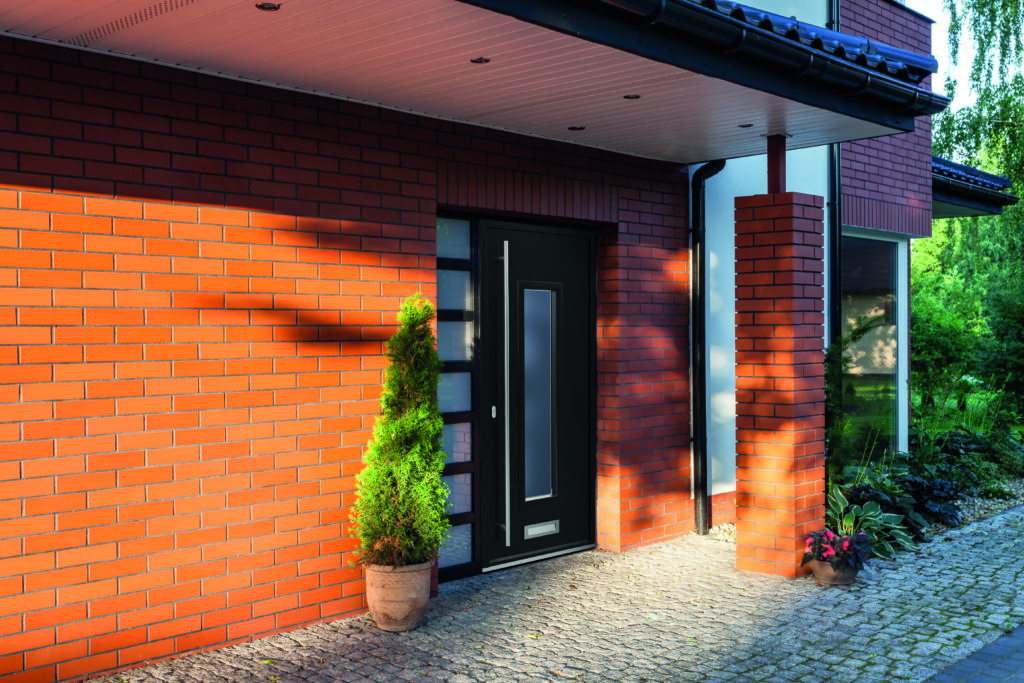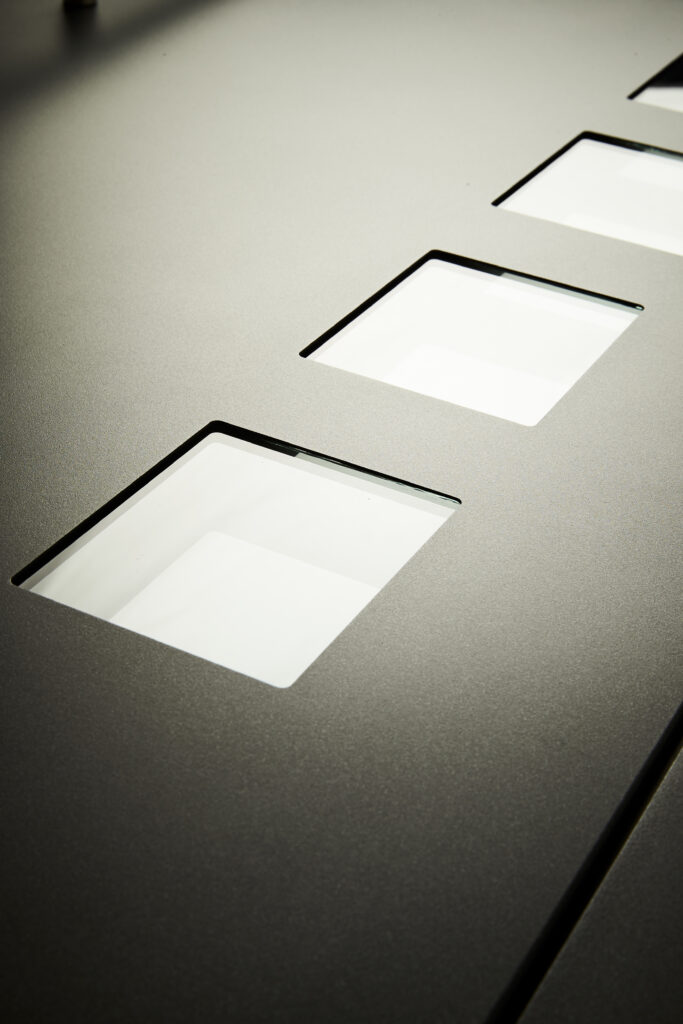Are aluminium composite doors eco-friendly? Learn how they offer durability, thermal efficiency, and recyclable materials for a lower carbon footprint.
What You’ll Learn:
- How aluminium doors reduce energy waste
- Why aluminium is a sustainable material
- The lifespan benefits of composite construction
- How modern manufacturing minimises carbon impact
(Estimated Reading Time: 5-6 Minutes)

Introduction
Sustainability is top of mind for many homeowners—and rightly so. Choosing products that last, perform efficiently, and reduce environmental impact is no longer a bonus—it’s a priority. In this article, we’ll explore whether aluminium composite doors are environmentally friendly, how they compare to other door materials like uPVC or timber, and what makes the Smart Signature and Smart Designer ranges from Aluminium Composite Doors at GFD Homes a more sustainable choice for your home.
Quick Answer: Yes, Aluminium Composite Doors Are a Sustainable Option
Aluminium composite doors are among the most eco-conscious front door solutions available today. They combine recyclable materials, excellent energy performance, and exceptional durability—which together reduce their environmental footprint over time.
Here’s why:
- ✅ Aluminium is infinitely recyclable without loss of quality
- ✅ Their thermal insulation reduces your home’s energy usage
- ✅ Long product lifespan means fewer replacements and less waste
- ✅ Smart systems are UK-made, reducing carbon from transport
What Makes a Door Environmentally Friendly?
When judging the eco-credentials of a front door, consider:
- Material Sourcing & Recycling Potential
- Energy Efficiency in Use
- Longevity (How Often It Needs Replacing)
- Manufacturing Process & Locality
- Maintenance Requirements
- End-of-Life Disposal Options
Let’s see how aluminium composite doors perform in each category.
1. Aluminium Is Infinitely Recyclable
Aluminium is one of the most sustainable construction materials in the world:
- It can be recycled repeatedly without degrading
- Recycling aluminium uses 95% less energy than producing new
- Around 75% of all aluminium ever produced is still in use today
Smart Systems, who manufacture GFD’s Signature and Designer doors, use locally sourced, UK-extruded aluminium profiles—many of which contain high recycled content.
✅ That means fewer raw materials
✅ Lower transport emissions
✅ A reduced carbon footprint at every stage
2. High Thermal Efficiency = Energy Savings
Both Smart Signature and Designer doors achieve U-values as low as 1.0–1.2 W/m²K thanks to:
- Insulated PU foam or engineered timber cores
- Thermally broken aluminium frames
- Triple-glazed laminated glass options
- Fully sealed perimeter gaskets
Better insulation = less energy used to heat or cool your home
Which = lower carbon emissions and reduced utility bills
So your door pays back its footprint quickly by saving energy every day.
3. Built to Last: Less Waste Over Time
Sustainability isn’t just about the materials—it’s about how long they last.
| Door Material | Average Lifespan |
| Aluminium Composite | 30+ years |
| Timber | 20–25 years |
| uPVC | 15–20 years |
| GRP Composite | 20–25 years |
Smart doors require no repainting, no re-sealing, and minimal maintenance. That means:
- Fewer door replacements over your lifetime
- Less landfill waste
- More resource-efficient design
4. UK Manufacturing = Lower Carbon Footprint
Smart aluminium doors are manufactured in the UK, which reduces:
- Shipping emissions (compared to imported doors)
- Energy waste from long-distance freight
- Excess packaging
This also ensures:
- Strict compliance with UK environmental regulations
- Transparent production processes
- Faster delivery with lower impact
Choosing a UK-made door system over a cheap imported product is a smart move—environmentally and economically.
5. No Harmful Chemicals or Finishes
Smart aluminium doors are powder-coated—not painted or treated with VOC-heavy finishes. Powder coating:
- Emits no solvents or harmful gases during application
- Produces minimal waste
- Is durable for 25+ years, even in marine environments
This is in contrast to:
- Timber doors, which often need oil-based paints or preservatives
- uPVC doors, which are made using high-energy, chlorine-based polymers
With aluminium composite, you get clean production and clean maintenance.
6. End-of-Life: 100% Recyclable
When your door eventually reaches the end of its life (decades from now), the aluminium frame and core materials can be:
- Dismantled
- Sorted by type
- Recycled into new construction products
Unlike uPVC, which is difficult and costly to recycle safely, aluminium composite doors are easy to reclaim.
Even laminated glass (used in Smart glazed doors) is becoming increasingly recyclable thanks to new UK-based recycling facilities.

How They Compare to Other Door Types
| Feature | Aluminium Composite | Timber | uPVC | GRP Composite |
| Recyclability | ✅ Excellent | ⚠️ Limited | ❌ Difficult | ⚠️ Limited |
| Thermal Efficiency | ✅ U-values ~1.2 | ⚠️ Variable | ⚠️ Average | ✅ Good |
| Lifespan | ✅ 30+ years | ⚠️ 20–25 yrs | ❌ 15–20 yrs | ✅ 20–25 yrs |
| Paints/Chemicals Needed | ❌ None | ✅ Required | ❌ None | ❌ None |
| CO2 Savings Over Lifetime | ✅ High | ⚠️ Moderate | ❌ Low | ✅ Moderate |
| UK Manufacturing Available | ✅ Yes | ⚠️ Some | ✅ Yes | ✅ Some |
How GFD Homes Supports Sustainable Choices
At GFD, sustainability isn’t just a buzzword—it’s a priority. That’s why we:
- Partner with Smart Systems, one of the UK’s most eco-forward aluminium manufacturers
- Offer fully recyclable doors, frames, and accessories
- Promote energy-saving door designs that help customers reduce their carbon footprint
- Package smartly and ship efficiently with reduced waste and plastic use
We’re also always happy to advise you on:
- Door materials and finishes with the lowest impact
- Options that suit eco-conscious renovations or new builds
- How to combine style, security, and sustainability
Final Thoughts
Aluminium composite doors are a sustainable, high-performance option for any modern home. From recyclable materials to long-term energy savings, they’re a smart choice for homeowners who care about the planet as much as they care about kerb appeal.
At GFD Homes, we’re committed to offering doors that look great, perform brilliantly, and support a greener future.
Still deciding? You might be wondering:
- “How long will this door really last?”
- “What makes Smart doors more eco-friendly than others?”
- “Is aluminium still sustainable if it’s imported?”
Let’s talk. The GFD Homes team is here to help you choose a door that protects what matters most.
🛒 Browse the full collection at www.aluminiumcompositedoors.com.
📞 Or call 01642 309576 for expert guidance and a no-pressure quote.
In a rush? Why not contact us via Whatsapp
👉 Explore our full range of aluminium composite doors
Browse our Articles
- How Energy Efficient Are Aluminium Composite Doors?
- Aluminium Composite Doors in Bad Weather: How They Perform
- Why Aluminium Composite Doors Outlast the Rest
- Trade Aluminium Composite Doors: looking for trade prices? Visit our trade site, The Trade Village
Common Questions About Sustainability
1. Is aluminium really better for the environment than timber?
Yes, in the long term. While timber is renewable, aluminium is recyclable forever and requires far less upkeep (which often involves chemicals).
2. What happens when my aluminium door reaches end of life?
It can be broken down into recyclable materials—aluminium, glass, and gasket components—with very little waste.
3. Does the powder coating emit harmful gases?
No. Powder coating is a dry, solvent-free process that emits zero VOCs.
4. Do Smart doors contain recycled aluminium?
Yes—Smart Systems use partially recycled aluminium content in their profiles, helping reduce reliance on raw ore.
5. Can an aluminium composite door help my home’s EPC rating?
Yes. A highly thermally efficient front door contributes to a better EPC score, especially when combined with other upgrades like glazing and insulation.